20/5/2015 – INFORMATION ON THE CONDUCT OF THE JUDICIAL COUNCIL, PRESIDENTS OF THE BASIC COURT IN PODGORICA, HIGH COURT IN PODGORICA AND THE BAR ASSOCIATION OF MONTENEGRO ON COMPLAINTS AGAINST JUDGES AND ATTORNEY IN THE TRIAL AGAINST MOLDOVAN CITIZEN SVETLANA ČABOTARENKO (S.C.) FILED FIVE MONTHS AGO
20/05/201526/5/2015 – ON THE ELEVENTH ANNIVERSARY OF MURDER OF DUŠKO JOVANOVIĆ
26/05/201525/5/2015 – COMMEMORATION OF 23 YEARS OF UNPUNISHED WAR CRIME DEPORTATION OF BOSNIAN MUSLIM REFUGEES
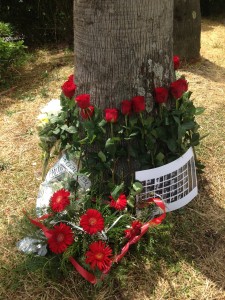 This May we are commemorating 23 years since the war crime was committed in Montenegro against Bosnian-Herzegovian Muslim refugees, so called “Deportation of refugees”. At least 66 Bosnian Muslim civilians were illegally arrested on the territory of Montenegro and handed over to their enemy army of Bosnian Serbs in Bosnia and Herzegovina.
This May we are commemorating 23 years since the war crime was committed in Montenegro against Bosnian-Herzegovian Muslim refugees, so called “Deportation of refugees”. At least 66 Bosnian Muslim civilians were illegally arrested on the territory of Montenegro and handed over to their enemy army of Bosnian Serbs in Bosnia and Herzegovina.
Non-governmental organisations Human Rights Action, Centre for Civic Education and Anima organised on Monday, 25 May 2015, a memorial gathering in front of the Security Center Herceg-Novi marking the 23rd anniversary of this crime. The commemoration was attended also by the representatives of NGOs “Number 19” and Movement for Neutrality of Montenegro, head of the municipal caucus club of the Democratic front and Movement for Change, Mr. Milovan Baždar, head of the municipal caucus club of the Social-Democratic Party, Mr. Dragan Šimrak, as well as the wife and son of late Mr. Osman Bajrović who was arrested and deported and whose grave remains unknown to date.
The audience was addressed by Ms. Tea Gorjanc Prelević, executive director of NGO Human Rights Action, Ms. Nedžiba Bajrović, wife of late Osman Bajrović, Mr. Dragan Šimrak and Mr. Milovan Baždar, who jointly advocated for:
– Placing a memorial in front of the Security Center Herceg-Novi building,
– Establishing the Day of Remembrance for the victims of the crime of deportation, and
– Criminal justice for victims including determination of individual criminal responsibility for the war crime that remains unpunished to date.
As a reminder, mostly in May 1992 the Montenegrin police illegally detained at least 66 civilians fleeing to Montenegro from the war-torn Bosnia and Herzegovina, and handed them over as hostages to the Bosnian Serbs Army for the exchange of prisoners of war. The refugees deprived of their liberty, as a rule, were brought to the Security Centre in Herceg-Novi, which served as a gathering centre, wherefrom on 25 May 1992 one group was transported by bus to a concentration camp in Foča, and another bus on 27 May 1992 to an unknown location in eastern Bosnia. Most of them were immediately killed, others were killed in the camps, and a few survived torture and in the end were exchanged. The burial place or the exact place where they were killed of some of the victims deported from Herceg Novi on 27 May 1992 remains unknown.
The investigation was initiated only in late 2005, a year after the relatives of the victims of deportation filed their claims for compensation. The information on the opening of the investigation was used as an argument by the state against the victims’ civil claims and that is how the public learned about it. Following several years of court proceedings, in December 2008, the Government of Montenegro settled the case and agreed to pay compensation to the surviving victims and families of those who were killed.
In the criminal proceedings, the state prosecutor’s office indicted several police and state security officers for the war crime against civilian population for the action of ”forced resettlement” and not also ”taking of hostages” and ”deportation to concentration camp”, which were the acts that had actually taken place in May 1992. The Higher Court in Podgorica in its judgment that became final on 17 May 2013 acquitted all persons indicted for this crime because they did not have the status of “members of the party to the conflict in Bosnia and Herzegovina”, i.e. those “who were in service of the party to the conflict in Bosnia and Herzegovina”, which was allegedly necessary to deem that they had committed a war crime. Meanwhile, the expert of the European Union, Maurizio Salustro, in his report on the prosecution of war crimes in Montenegro pointed out that the requirement for criminal responsibility for war crimes established by the court was incorrect and unknown to international humanitarian law and practice, where the responsibility does not entail any formal status of a perpetrator, but the context of an armed conflict that has affected him to commit the crime.
Finally, on 25 March 2015, the Supreme State Prosecutor’s Office of Montenegro filed a motion for judicial review of that judgment, requiring the Supreme Court to establish that the law had been violated in favour of the accused former police officers, officials of the Ministry of Interior and State Security Agency. HRA urged the state prosecutors to file that motion two years ago.
Non-governmental organizations (HRA, CCE and Anima) and President of the Council for Civilian Control of Police Operations, Aleksandar Saša Zeković, filed three initiatives several years ago:
• An initiative to the President of the Parliament of Montenegro, Ranko Krivokapić, and the heads of all parliamentary clubs, to declare 27 May as the Day of Remembrance for the victims of the crime of deportation of refugees from Montenegro in 1992;
• An initiative to the then Prime Minister of Montenegro Igor Lukšić, Minister of Interior Ivan Brajović, and Minister of Culture Branislav Mićunović, as well as to the then President of the Municipal Assembly of Herceg Novi Dejan Mandić, to erect a memorial to the victims of 1992 deportation of refugees in front of the Police Directorate building in Herceg-Novi, thus also recognizing the desire of the families of deported victims;
• In 2012 one more initiative was submitted – for the Montenegrin police to apologize for the use of police powers during the deportation of refugees from Bosnia and Herzegovina.
Not one initiative has been accepted to date. As a reminder, the then President of the Municipal Assembly of Herceg Novi, Dejan Mandić, said that the city of Herceg Novi was not ready to support the initiative for the erection of a memorial, and that he did not address higher authorities with regard to this initiative – in this case the Ministry of Culture. Prime Minister Igor Lukšić on 11 July 2011 opened a “monument to all victims of the 1991-2001 wars”. On that occasion we stated that we found it inappropriate and useless to shove all the victims under the same, nameless monument, which did not communicate anything about what had happened in that decade, who these victims were and who was responsible for them becoming victims. Therefore, the said monument cannot be considered a response to the initiative.
* * *


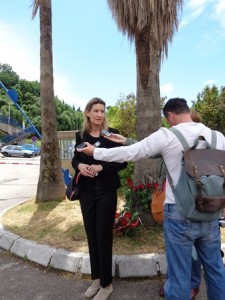
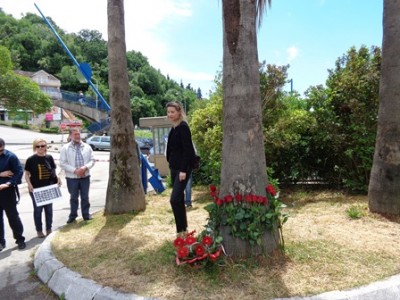
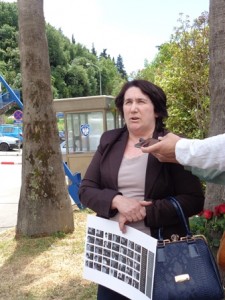
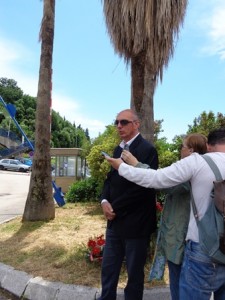
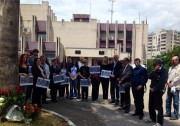
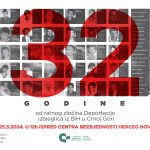


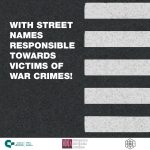

 English
English